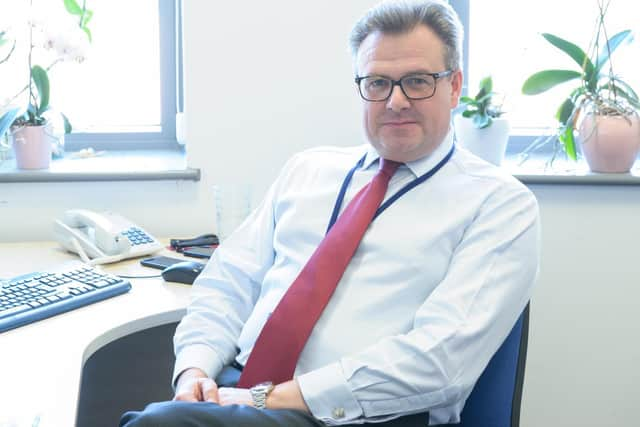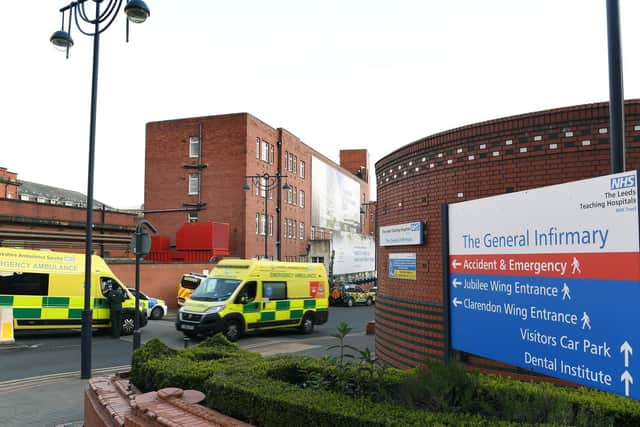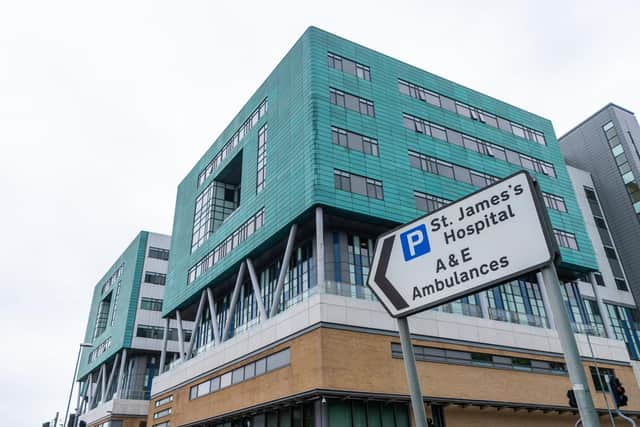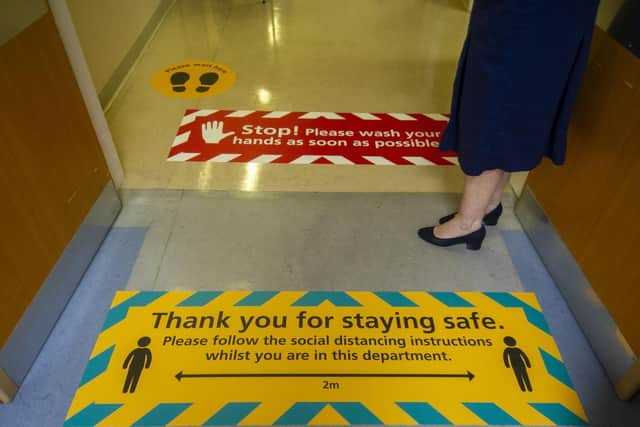Leeds hospital trust chiefs are bracing themselves for 'extraordinarily difficult winter'
and live on Freeview channel 276
The harsh reality facing health chiefs at the city’s hospitals over the next few months has led to intensive plan of action, says Dr Phil Wood, chief medical officer at Leeds Teaching Hospitals NHS Trust (LTHT) as they prepare for perilous mix of the “always challenging” winter season, a likely second surge of coronavirus, while also still recovering from the aftereffects of the pandemic so far.
Earlier this week, the Yorkshire Evening Post revealed stark figures which laid bare the scale of the impact the crisis had wrought on hospital services so far this year - with the numbers of cancer patients being seen within two weeks of a GP referral hitting a record low in July and backlogs of diagnostic testing hitting a high of 27,096 at the pandemic’s peak.
Advertisement
Hide AdAdvertisement
Hide AdBut Dr Wood said the Trust is now “well on its way” to catching up with itself - and the current plan is to continue routine activity even during a second Covid-19 wave, a crucial difference from the first outbreak, when everything was paused.


He told the Yorkshire Evening Post: “It’s a really challenging time for all the staff, myself included. We are really aware that patients aren’t necessarily getting to the treatment they need and some people have been waiting from before March, when the pandemic started, and are still waiting.
“It’s very frustrating that some patients, surgery in particular, have had to wait. But we have been very conscious of not putting patients at risk by coming into an environment where they might catch Covid. Which could be terrible for them and could be worse than having waited longer for surgery.”
Stressing the hospital service has and will continue remain open to those in need, he said: “I’m confident we have been there for any patient that has needed emergency or treatment for a serious condition”, adding: “Our staff in this organisation have really rallied from day one of the pandemic and their commitment to patients has been absolutely outstanding. I think that’s really helped us.”
Advertisement
Hide AdAdvertisement
Hide AdNow, as the hospitals gear up for the coming months, Dr Wood said they feel “well prepared” and have learned lessons from the first wave to improve their response.


He said: “Winter is always a challenging time for the NHS. Even if Covid wasn’t here, we would be still coming into flu season. That is hard for staff because people catch flu and come into the hospital with it.
“Tying to balance managing our planned activity along with the pressure on our emergency departments is hard.
“We are aware that we are steeling ourselves for what is going to be an extraordinarily difficult winter. And we are, as always, reliant on the public using our services only when they need to - and not using our services when they don’t need to.”


Advertisement
Hide AdAdvertisement
Hide AdHe said, as seen nationally, Leeds' hospitals have begun seeing rising numbers of Covid-19 patients already.
“It’s been creeping back up in the last few weeks. We’ve started to get more patients. It’s not risen as quickly as it did the first time around - the numbers are increasing but fairly slowly at the moment.”
During the first wave, the Trust had to create 280 critical care beds by taking over operating theatres. Of the Trust's 59 operating theatres, only ten were in operation during the first wave - adding to the backlog in planned care.


In the early days of the pandemic, private chains such as Spire and Nuffield took over the Trust's less urgent patients and are now helping to take the strain by carrying out planned surgeries and diagnostics of up to 800 patients per month.
Advertisement
Hide AdAdvertisement
Hide AdDr Wood said a stronger link between the hospitals and GPs has also been a “very positive” consequence of the pandemic, in helping to support patients who have had to wait longer to be seen.
Now, the hospitals remain poised to once again redeploy staff and create additional critical care beds if the second wave emerges, as feared.
“We have these plans ready but at the moment we haven’t had to enact as the numbers are still quite low.”
And the well-being of staff is at the forefront of hospital bosses’ minds as they prepare for what lies ahead.
Advertisement
Hide AdAdvertisement
Hide AdDr Wood said: “We have developed a psychological support structure for our staff because obviously [during the first wave] they were dealing with patients with a different illness than they have looked after before and, to put it bluntly, we had more deaths in our hospital.
“Staff were dealing with a much more traumatic work environment than perhaps they would have been used to.”
This time plans include trying to keep existing teams together as they move around the hospital to treat Covid-19 patients, to help them feel more supported.
Another key lesson learned from the first wave was the need to test patients who were ready to be discharged into care homes - a strategy not in place at the beginning, adding to the much-publicised devastating consequences for the social care sector where Covid ran rife.
Advertisement
Hide AdAdvertisement
Hide AdDr Wood said: “We are really aware of some of the situations first time around with patients being discharged with Covid into care.
“When people were well enough to be discharged from hospital, we were discharging them. But, as was happening nationally, some of our patients were probably positive at that time.
“But actually our processes are much better now around testing patients and making sure they are free of infection before that happens. That’s been a real success for the city.”
A message from the Editor: Leeds has a fantastic story to tell - and the Yorkshire Evening Post has been rooted firmly at the heart of telling the stories of our city since 1890. We believe in ourselves and hope you believe in us too. We need your support to help ensure we can continue to be at the heart of life in Leeds.
Advertisement
Hide AdAdvertisement
Hide AdSubscribe to our website and enjoy unlimited access to local news and information online and on our app. With a digital subscription, you can read more than 5 articles, see fewer ads, enjoy faster load times, and get access to exclusive newsletters and content. Click here to subscribe. For more details on our newspaper subscription offers click here.
Thank you
Laura Collins
Comment Guidelines
National World encourages reader discussion on our stories. User feedback, insights and back-and-forth exchanges add a rich layer of context to reporting. Please review our Community Guidelines before commenting.